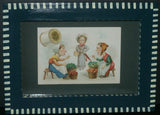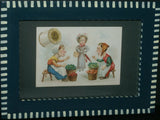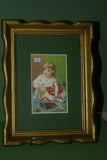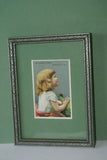EPHEMERA AMERICANA WHIMSICAL ART, AD: 1887 PROFESSIONALLY FRAMED (IN A HAND PAINTED FRAME BY ARTIST) AND MATTED, ANTIQUE VICTORIAN ADVERTISING TRADE CARD: J.& P Coats MARKET (DFPO2R) DESIGNER COLLECTOR COLLECTIBLE DELIGHTFUL WALL DÉCOR
RARE, AUTHENTIC 1880'S ANTIQUE VICTORIAN AD EPHEMERA TRADE CARD:
J.& P. Coats Best Six Cord Sewing Thread, WOMEN SELLING PRODUCE GOSSIPING WHILE WAITING FOR CLIENTS.
OVER 100 YEARS OLD, ORIGINAL. GREAT CONDITION AND FRAMEDCARDS IN A CUTE FUN HAND PAINTED FRAME BY ARTIST WITH MAT AND GLASS, READY TO HANG ON THE WALL.
Item: DFPO2R.
This antique Victorian Era, highly collectible, Trade Card has been professionally matted and framed. Finished in frame size is 7.25” x 5.25”. Item can be seen on most of the photos. The additional photos show other trade cards professionally framed and available in our sales
Americana Antique
The back of the card advertises the company which sold this product at the end of the 19th century. These cards are getting harder and harder to find today.
These cards mark the first time in American history affordable color printing was possible
This card is in GREAT condition for its age
It is an original!
Makes a great gift for collectors of rare 1800's memorabilia.
In the last third of the nineteenth century, an unprecedented variety of consumer goods and services flooded the American market. Advertisers, armed with new methods of color printing, bombarded potential customers with trade cards. Americans enjoyed and often saved the vibrant little advertisements found in product packages or distributed by local merchants. Many survive as historical records of commercialism in the United States.
J. & P. Coats is an originally Scottish fine-thread company that was founded by a weaver called James Coats (1774-1857) and his brother Patrick, in Paisley, near Glasgow. The story of Coats is complicated, as it involves British as well as North American based companies, run by various members of the Coats family. It was also closely involved in the activities of the rival Scottish company of Clark.
In the early 1800's, James and Patrick specialized in making the cotton yarns that were used for loom heddles (in a street that became known as Cotton Street). James Coats also set up a business in the early 1820's dealing in silks (yarns and cloth), in particular for the ‘cork’ or tambour trade. And in 1826, he set up a business based at Ferguslie, Ayrshire, for the production of cotton yarns. This business was called J. Coats.
James Coats retired in 1830 and his sons, James, Peter, Thomas and Andrew took over the company, re-naming it J. & P. Coats. The company specialized in producing a wide range of threads especially for crochet, embroidery and sewing. Each of the brothers was concerned with a particular aspect of the company, such as product development (James), sales and accounts (Peter), technology (Thomas), etc.
Andrew had the responsibility for developing international sales, including in North America. As a result of his activities and from the 1830's onwards, J. & P. Coats was sending commercial agents to the USA and Canada. Despite restrictions on the production and sale of cotton due to the American Civil War (1861-1865), Coats continued to grow in the USA and in 1866 J. & P. Coats opened a mill in Pawtucket, Rhode Island, to produce a wide range of threads. It was in the 1880's that more USA based mills were added and the development of the famous Coats trade cards to spread information about their products took off.
We recently closed our gallery of rare antique books and prints, original signed art, rare textile art and unique hand painted frames, some of the prints and art framed, some not, and all our artwork and antique prints will be listed here daily as we go.









































